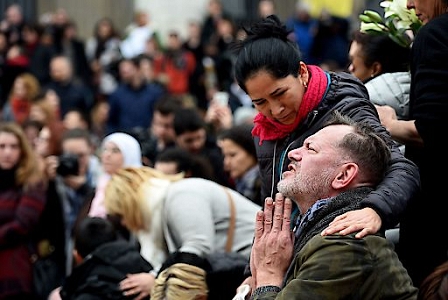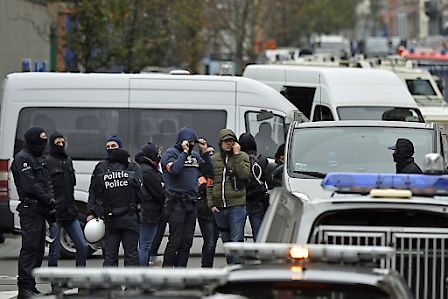Erstellt am: 23. 3. 2016 - 16:02 Uhr
"Nobody is safe in Europe"
FM4 Reality Check
Hear the programme in the FM4 Player or subscribe to the podcast and get the whole programme after the show
Belgium is in mourning, and as more and more details emerge of the connections between the yesterday's attacks on Brussels and the Paris attacks in November, the failings in the Belgian security services are becoming increasingly obvious.

AFP PHOTO / PATRIK STOLLARZ
Despite the ongoing efforts to round up the perpetrators of the Paris attacks, the list of suspects remains long, and the number of arrests remains short.
Even though the Paris suspects were quickly traced to a particular Brussels suburb, it seems the Belgian authorities have been overwhelmed by the task of rounding them up and breaking up the terror cell.
On today's Reality Check, Matthew Karnitschnig, Chief Europe correspondent at Politico, gave his views on the the lack of personnel and resources that is hampering the work of the Belgian police.
MK: I think that’s actually the core problem of what’s happened over the last couple of days. Just last week, if you remember, the Belgians were trumpeting this great breakthrough, what appeared to be a great breakthrough, in capturing the main terrorist still at large from the Paris attacks. And while that was clearly progress, it wasn’t enough. Now it turns out that there were several others, and there was this plot that had yet to be hatched. Even though they caught Abdeslam, they didn’t get out of him that this other attack was pending, and he had associates out there that were about to carry it out. So, I think it is a very serious issue in Belgium, and I think that the rest of Europe is going to pressure the Belgians now to really do more, to cooperate more deeply with the other European countries, in terms of sharing information, in terms of allowing them to give Belgium more assistance in trying to break up these jihadist networks that are clearly still active.
SC: I mean, why isn’t there more support from the EU generally, from Europol, when terrorists just disappear across borders themselves?
MK: Well, I think the main reason is that it cuts right to the heart of a country’s national sovereignty, and this is the last thing most countries want to give up. Once you start cooperating at a very deep level on intelligence matters, other countries can find out pretty much everything about you, and not everybody is going to be comfortable with that. I think the other issue here is that there really isn’t an effective EU-wide counter intelligence service. You mentioned Europol, but it’s not really the same as having something like the FBI in the United States, or other national agencies in Europe, even, the BND in Germany and so forth. I think what the Belgians need in the immediate term is really more assistance from the larger European intelligence services, in Germany, in France, in the UK, because these small countries, they just don’t have the resources to deal with a threat on this scale. I think the Belgians have something like 600 people working in the department responsible for these issues, and it clearly isn’t enough. The fact that it took them four months to find the terrorist they arrested on Friday, even though he was right under their noses and still communicating with his associates, and indeed living with his friends and family over that time, really suggests there are much deeper issues in the Belgian security apparatus.

AFP / BENOIT DOPPAGNE
SC: Indeed. Interior Ministers are meeting, surely they have to come up with something like a European response to the threat in general.
MK: I think we’re going to have to wait a little bit longer to see that. One of the problems is that they announce a meeting, and then they announce a plan, and it takes a very long time to realize these plans, to bring them to fruition. So, I think that what we’re seeing with this latest meeting of the Interior Ministers is more directed at the public relations, to show Europeans that they are cooperating, they are thinking about these issues, they’re coming up with plans. But before something is really in place it could be a while, which is why I think that these bilateral discussions are probably more effective in terms of Belgium cooperating much more directly with the Germans, and with the French, in particular.
SC: Islamic State have claimed responsibility for these attacks – they have put out a message in German – it that significant, that they’ve put it out in German?
MK: Well, it shows that they want to send a message that nobody is safe in Europe, and certainly the Germans aren’t safe either. It is a reminder that they feel they can act all over the continent at will. I think it’s interesting that some of the analysis over the past day has been that this is actually a sign of Islamic State’s weakness because of all the territory they have lost, and the pressure they are under in Syria itself, that they are now resorting to old-style terrorist attacks to remind people of their relevance. So, we'll see. They certainly have the capacity to launch attacks like this, but on the other hand it’s not too complicated to walk into an airport terminal with a bomb, and detonate it.
FM4 Reality Check
Monday to Friday from 12.00 to 14.00, Saturday from 12.00 to 13.00, and after the show via Podcast or fm4.orf.at/realitycheck.



